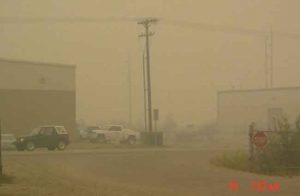
Seattle — Today, the U.S. Environmental Protection Agency announced that the Alaska Department of Environmental Conservation has been recommended to receive approximately $2.5 million in Clean Air Act Targeted Airshed grant funds to help improve air quality in Fairbanks, Alaska.
Grant awards will be made upon successful completion of the award application process. Targeted Airshed funds will be used to reduce air pollution through a woodstove change-out program in the Fairbanks North Star Borough.
“The state of Alaska and the Fairbanks North Star Borough have been great partners working with the community to reduce wood smoke pollution and improve the area’s air quality,” said EPA Administrator Scott Pruitt. “We’re pleased that Targeted Airshed grant funds will be available to help further energize the community’s ability to reduce air pollution and breathe cleaner air.”
“We thank EPA for this funding for the Fairbanks North Star Borough and its citizens, who are stepping up to meet the challenge of reducing wood smoke, and we are pleased these new funds are available to support the local change-out program,” said Alaska DEC Commissioner Larry Hartig. “Each individual action to replace an old wood stove and burn dry wood wisely is a step toward healthier air.”
“The woodstove change-out program is the backbone of our air quality improvement strategy,” said Fairbanks North Star Borough Mayor Karl Kassel. “Having secure funding for this program is a blessing, especially in light of tightening restrictions. We are extremely thankful to the EPA for providing this financial support.”
In 2009, EPA designated the Fairbanks North Star Borough airshed as nonattainment for fine particle pollution under the Clean Air Act National Ambient Air Quality Standards. The borough has been unable to meet the 24-hr fine particle or PM2.5 standard and has recorded the highest level of fine particle pollution in the nation.
Fine particle pollution levels spike in Fairbanks during the many severe cold air inversions that occur each winter. The biggest source of fine particles are the woodstoves and hydronic heaters many residents use to heat their homes, contributing 60 to 80 percent of pollution levels during the winter.[xyz-ihs snippet=”Adsense-responsive”]
